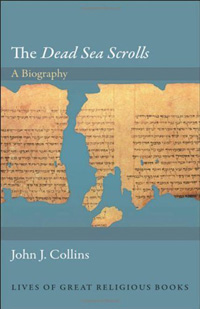Book Notes
 John J. Collins, The Dead Sea Scrolls: A Biography (Princeton: Princeton University Press, 2013), 272pp.
John J. Collins, The Dead Sea Scrolls: A Biography (Princeton: Princeton University Press, 2013), 272pp.
In late 1946 three Bedouin shepherds found seven ancient scrolls in a cave at a place called Qumran, nine miles south of Jericho and thirteen miles east of Jerusalem, near the north west corner of the Dead Sea. Their accidental discovery turned out to be one of the greatest and most controversial archaeological discoveries in modern times.
Eventually, 972 manuscripts and fragments were found in eleven caves, all within a radius of about two miles. About 200 of the scrolls were manuscripts from every book of the Bible except Esther, including "the earliest known manuscript of the entire book of Isaiah," which turned out to be a thousand years older than any previous complete manuscript of Isaiah. The so-called Copper Scroll describes two hundred tons of gold and silver hidden in sixty-four sites around the countryside. Other scrolls are liturgical in nature. Some scrolls are well preserved, others are so fragile that they would disintegrate if you handled them.
The Qumran site was subsequently excavated and contained troves of ancient treasure — coins, pottery, cloth, rope, baskets, etc. The relationship between the site and the scrolls remains a matter of debate and conjecture. Next to the excavated site is a cemetery with over a thousand graves, which graves present a whole set of their own interpretive problems. Most scholars now understand Qumran to be the site of the Essene community of sectarian Jews referred to by Philo, Josephus and Pliny the Elder. The scrolls and the Qumran site have now been dated to the last two centuries BCE to the first century CE, a tantalizing time period for Jews and Christians alike.
Virtually everything about the scrolls has been controversial. Their discovery occurred just before the formation of the state of Israel in 1948. Publication and availability to the scholarly public has taken over fifty years. Careers have been ruined, principle players have died, lawsuits have been made and appealed, and charges of plagiarism have dogged some of the publications. John Collins, professor of Old Testament studies at Yale, has written a readable, reliable, and fair minded account of the Dead Sea Scrolls. He lets even the most bizarre theories have their say, but always indicates where and why evidence is inconclusive and explanations are speculative. At the end of each chapter he provides brief suggestions for further reading.
This is the seventh book in a series of twenty-one "biographies" of great religious books by Princeton University Press. The Lives of Great Religious Books is a "series of short volumes that recount the complex and fascinating histories of important religious texts from around the world" (dust jacket). The volumes pair leading experts with classic texts and are written for a general audience. In earlier reviews for Journey with Jesus I've covered Augustine's "Confessions" by Garry Wills, Dietrich Bonhoeffer's "Letters and Papers From Prison" by Martin Marty, and The Book of Mormon by Paul Gutjahr.


